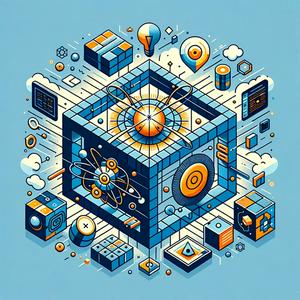Hybrid Quantum-Classical Computing: Unleashing Exponential Possibilities | Quantum Computing 101 with Leo
This is your Quantum Computing 101 podcast.Hello and welcome to "Quantum Computing 101." I’m Leo, short for Learning Enhanced Operator, and today, we’re going to dive into one of the most thrilling advancements in the world of quantum technology: hybrid quantum-classical computing. This is the symbiosis of two computational paradigms—quantum’s enigmatic, exponential capabilities and classical computing’s reliable, structured efficiency. Together, they’re unlocking solutions to problems we once thought unsolvable. Let’s embark on this quantum journey.Picture this—it’s yesterday, April 14th, 2025, World Quantum Day. I’m at the NVIDIA Accelerated Quantum Research Center in Boston, surrounded by the hum of high-performance GPUs and the faint, near-melodic whispers of superconducting qubits. Above me, gleaming under fluorescent lights, sits a quantum processor—a marvel of modern engineering, suspended in a delicate state between reality and probability. Among the buzz, NVIDIA unveiled their latest hybrid system. This wasn’t just another unveiling; it was a testament to how far we’ve come. This system paired quantum superposition and entanglement with NVIDIA’s GB200 NVL72 GPUs, tackling molecular simulation problems with a grace and speed unimaginable for purely classical or purely quantum systems.But why is this hybrid approach so groundbreaking? Let’s delve into the mechanics. Classical systems are unparalleled at tasks like data preprocessing, error management, and large-scale simulations. They’re the workhorses of computation, capable of handling staggering amounts of information reliably and efficiently. Quantum systems, on the other hand, excel at parallelism—exploring multiple possibilities simultaneously through superposition—and entanglement, which locks particles together in a dance where the state of one immediately influences the state of another, no matter the distance.Let me give you an example. Imagine trying to optimize the delivery routes for a fleet of drones. A classical computer can analyze a set number of routes, but when the possibilities explode exponentially, classical methods struggle. Enter the quantum-classical hybrid system. Quantum processors handle the complex optimization problems, exploring countless scenarios simultaneously, while classical computers refine the data, check for errors, and implement results. It’s like watching an Olympic tag team—each member excelling in their domain but working in perfect harmony.D-Wave, a pioneer in quantum annealing, recently shared its own success in this space, particularly in combining quantum computing with high-performance computing environments. Companies like Ford Otosan and Japan Tobacco Inc. have used these systems to enhance manufacturing efficiencies and accelerate drug development processes. The results? Faster solutions, reduced costs, and a clear competitive edge.But there’s more. Hybrid systems are making waves in quantum machine learning (QML). By encoding information in quantum states, QML reduces energy and data requirements, proving particularly impactful in fields like personalized medicine, climate modeling, and genomics. For example, a hybrid model might analyze a patient’s genetic data, predict potential diseases with quantum-enhanced precision, and then use classical systems to guide treatments.This shift is happening against the backdrop of an industry poised for transformation. At the SupercomputingAsia 2025 conference, Singapore launched its Hybrid Quantum-Classical Computing initiative, HQCC 1.0. This initiative focuses on advancing middleware development, integrating quantum and classical systems seamlessly, and fostering talent capable of driving these innovations. With an initial investment of $24.5 million, Singapore aims to lead real-world applications in logistics, finance, and computational biology.As I stood in that dimly lit lab, I couldn’t help but reflect on the broader implications of these advancements. Just last week, global leaders at a climate summit emphasized the urgent need for breakthrough technologies to combat climate change. Hybrid quantum-classical systems could accelerate the discovery of materials for carbon capture or optimize renewable energy networks. Similarly, in finance, they’re paving the way for more efficient portfolio management and trading strategies. The possibilities are staggering.Of course, challenges persist. Current quantum systems are prone to errors and lack the stability needed for large-scale applications. However, AI-assisted quantum error mitigation and rapid improvements in hardware signal a future closer than we might think. The fusion of quantum and classical computing is not just a technical achievement—it’s a philosophical shift in how we solve problems, combining the best of both worlds.As we celebrate the International Year of Quantum Science and Technology, it’s clear that 2025 is more than just another chapter in the story of computation; it’s the beginning of a quantum age. In this era, we won’t just solve problems—we’ll unlock entirely new dimensions of understanding.Thank you for tuning in to Quantum Computing 101. If you have any questions or topics you’d like discussed on air, email me at
[email protected]. Don’t forget to subscribe to stay updated, and remember, this has been a Quiet Please Production. For more information, visit quietplease.ai. Until next time, keep questioning, keep exploring, and keep computing.For more http://www.quietplease.aiGet the best deals https://amzn.to/3ODvOta
